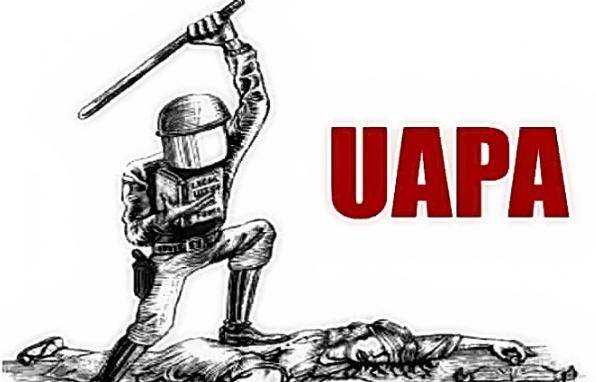
13-Sep-2020
Understanding The UAPA Act
The arrest of JNU alumnus leader Umar Khalid on charges of conspiracy in connection with the Delhi Riots Special Cell of Delhi Police has ordered the Unlawful Activities (Prevention) Act (UAPA) ). Under this law, many famous and social activists have been arrested earlier. A year ago, when this law was being passed in Parliament, it was still very rude and it was said that it violates constitutional rights.
Amidst the support of some parties and opposition from some, the NDA Government (BJP) at the Center had passed this law, but since then this law has been in the discussion because it gives unlimited powers to the government and investigative agencies and There is a possibility of its misuse. Know how strict is UAPA, this law related to the arrest of Omar Khalid and all the special things related to it.
Under UAPA, very stringent provisions were made to prevent illegal activities in and outside the country. Last year, the government made some amendments to this 1967 law to make it tougher.
In 2019, the NDA government added some more provisions to this law so that the investigating agencies of the Center and the state governments could better deal with terror and Naxalism. Understand the provisions of this Act:
- The law applies throughout the country.
- Under this law, anticipatory bail cannot be obtained in the case.
- A case can be taken against any Indian or foreigner under this law. No matter the location or tendency of crime.
- In case of crime on foreign soil, a case can be filed under it.
- In India, this law may also apply in cases of crime in register ship or aircraft.
- This law is mainly to deal with terrorism and Naxalism.
- Any kind of individual or collective illegal activity, which threatens the security, unity and integrity of the country, is under the purview of this law.
- This law empowers the National Investigation Agency (NIA) to declare a suspect involved in any kind of terrorist activity as a terrorist.
Before this law, only groups could be declared as terrorists, but after this amended law in 2019, a person can also be declared as a suspected terrorist or terrorist.
READ HERE MORE : When Swami Vivekananda's Speech Rocked World Religious Conference
Earlier it was arranged that in any case of terrorism, the seizing of the property could not be carried out without the permission of the investigating officer, but this law provides that the investigating officer of NIA can take this action only with the permission of the DG of NIA. is. That is, this law gives unlimited powers to the NIA.
Not only this, in any case, related to terror, on the basis of any kind of commitment of any person, participation in the preparation of terror, promotion of terror or any kind of involvement, even on the basis of doubt, a person The Central agency can take action to declare a terrorist.
It is also important to note that as per the earlier rules, officers of the rank of DSP or Assistant Commissioner (ACP) were able to investigate any terror-related cases, but since this law, officers of the rank of NIA Inspector or above should be investigating officers in these cases. Can.
The arguments of the Center were that the stringent provisions of UAPA would make the investigation of NIA faster and stronger, it would be able to act quickly on the basis of suspicion in terrorist activities, declare organizations with dubious activities as terrorists and take action in the investigation of the state.
The barrier of cohesion will also end. In such a situation, the crime of criminals will increase, but the opposition said that this will increase the arbitrariness of the NIA and abuse of the law against minorities.
Before Umar Khalid, many activists and social personalities have been arrested under this act. In 2007, the famous doctor and human rights activist Binayak Sen, accused of Naxalite activity, in 2018 Sudhir Dhawale, who works for Dalit rights, Mahesh Raut, who works for tribals, the famous poet Varvara Rao has been arrested.
In the year 2018, the same law was imposed on Sudha Bhardwaj, research scholar Rona Wilson and journalist Gautam Navlakha, who were fighting for tribal rights. This year, this law was in the news when the Jammu and Kashmir Police imposed UAPA (Unlawful Activities Prevention Act) on the users who used social media unfairly in the valley.
According to this law, according to the definition of 'unlawful' activity, 'any activity which intends to harm the sovereignty, integrity, integrity of India, or denial' shall be deemed to be within this scope. This law provides for imprisonment of up to 7 years for any such activity. However, if someone is found guilty in any such illegal or terrorist activity, then the punishment can be life imprisonment or even the death penalty.

Content Writer
I am a Website Developer. And Write Articles on health, general, SEO, gaming, real estate, movies, songs and other reviews. and i also work on SEO search engine optomization.
Join Our Newsletter
Subscribe to our newsletter to receive emails about new views posts, releases and updates.
Copyright 2010 - 2026 MindStick Software Pvt. Ltd. All Rights Reserved Privacy Policy | Terms & Conditions | Cookie Policy